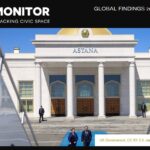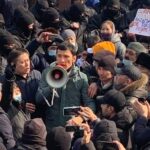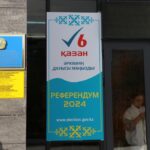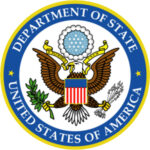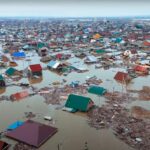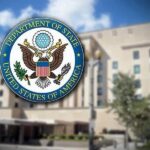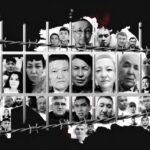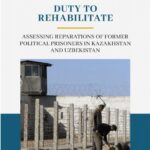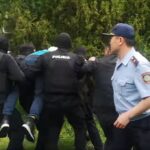HUMAN RIGHTS WATCH
Human Rights Watch Memorandum
May 20, 2009
In seven months, Kazakhstan will take on the chairmanship of the Organization for Security and Co-operation in Europe (OSCE), the first Commonwealth of Independent States (CIS) country to lead the organization. It is therefore an important time for Kazakhstan to make positive changes in light of the gaps between the country’s human rights record and the prominent role and responsibilities the chairmanship of the OSCE entails.
The OSCE announced that Kazakhstan would be given the 2010 chairmanship at the organization’s November 2007 Ministerial Council meeting in Madrid. At that time, Foreign Minister Marat Tazhin pledged improvements in human rights policies and practices to conform to the standards expected of a future chair of the OSCE. The pledges included promises to amend the media law, reform the law on elections, and liberalize the registration requirements for political parties by the end of 2008.
Foreign Minister Tazhin’s Madrid pledges were unprecedented and welcome. However, draft legislative amendments submitted by the government to parliament in November 2008, and signed into law in February 2009, in the areas covered by the pledges consisted of relatively minor changes that did little to address core problems. For example, amendments to the media law abolished the registration requirement for television and radio stations. This measure reduces the bureaucratic burden for television and radio media (which as in other jurisdictions must obtain a broadcasting license from the government), but not for other media. The amendments also, as described below, failed to address the broader problems with media freedoms in Kazakhstan.
Public statements by the European Union and the United States issued at the OSCE Permanent Council in February 2009 welcomed the new legislation, but underlined the need for further progress in the lead-up to Kazakhstan’s chairmanship to ensure full respect for OSCE standards.[1] The US also called on Kazakhstan “to take further steps to create the conditions for genuine political pluralism,”[2] while the EU statement pointed out that “it is essential that the OSCE institutions’ offers of advice be taken into account throughout the legislation process.”[3] These welcome statements should be followed by sustained, proactive engagement to impress upon the Kazakh leadership the necessity of meaningful reform.
Moreover, Kazakhstan’s human rights record is falling short in a number of key areas that were not covered by the Madrid pledges. Urgent and meaningful reforms are needed to address restrictions and violations regarding freedom of religion and freedom of assembly. In December 2008 Human Rights Watch published the report “An Atmosphere of Quiet Repression,” describing Kazakh government efforts to restrict religious freedom through a new law on religion-which Kazakhstan’s Constitutional Council has since found unconstitutional-and through harassment of small religious communities.[4] The report also documents how public assembly is very tightly controlled in Kazakhstan. Finally, the report documents the environment of anxiety in which the media operates-an area covered by the Madrid pledges-with journalists facing the constant threat of lawsuits and, not infrequently, direct threats to their person.
This memorandum summarizes concerns in these three areas, highlights developments since the publication of our December 2008 report, and outlines specific steps the Kazakh government should be urged to take to address problems in each issue area.
I. The right to freedom of thought, conscience, and belief
In the past several months the Kazakh government has undertaken a number of welcome steps to improve the situation of smaller religious communities. However, freedom of religion is still an area of concern and substantial improvements are needed.
The proposed religion law
On February 11, 2009, the Constitutional Council ruled that the proposed law “On introducing changes and additions to certain legislative acts on issues of freedom of religion and religious associations” (hereinafter proposed religion law) would violate the constitution.[5] One of the key elements of the ruling was its finding that certain provisions in the proposed law “do not ensure equality between religious communities”-specifically “religions previously not known in the Republic of Kazakhstan”-and that many provisions are vague and thus might create problems for implementation. The ruling did not elaborate which provisions were vague.[6]
The Constitutional Council’s ruling stopped a legislative process that had started in January 2007, came to a halt in June 2007, and resurfaced in spring 2008.[7] Local human rights groups and smaller religious communities welcomed the Constitutional Council’s decision. However, in meetings with a Human Rights Watch representative in March 2009 they expressed concern that the government might again attempt to restrict religious freedom as soon as the OSCE chairmanship has ended.[8] Their fear is not baseless: on at least one occasion the government has enacted a law containing provisions to which the Constitutional Council had previously raised objections.[9]
If adopted, the amendments would have seriously and unjustifiably restricted the right to freedom of thought, conscience, and belief. They proposed controls on religious freedom, including provisions to tighten registration requirements for religious communities, restrict missionary work and the distribution of religious literature, and penalize “unapproved” religious activities.[10]
The proposed law would have established a two-tier system for official recognition of religious communities, dividing them into two types: religious groups, which would have had no status as a legal entity and therefore very limited rights, and religious associations, which should have had 50 members or more in a given locality. A religious association would have been the only legally recognized entity for religious communities, thus penalizing small communities or congregations. The draft religion law would also have required all communities to reregister within 18 months of the law’s entry into force.
Comments on the draft amendments published by the OSCE’s Office for Democratic Institutions and Human Rights (ODIHR) Advisory Council on Freedom of Religion or Belief in January 2009 noted that the November 2008 text was an improvement over the initial version of the draft published in May 2008. However, the Advisory Council also stated that “significant problems remained”[11] and that many of the draft law’s provisions are “systematically over restrictive.”[12]
According to the Advisory Council’s comments, the rights of smaller religious groups would not be fully protected, because, among other reasons, the law “is structured to make it difficult for smaller groups to carry out the full range of religious activities in which such groups would reasonably be expected to engage.”[13] In addition, the comments criticize the vagueness of many provisions that “invite abuse of authority and discrimination by officials.”[14]
Small religious communities
While the law, had it entered into force, would have discriminated against smaller religious communities, in recent months the situation of several smaller religious groups has improved. In December 2008 the authorities registered the Atyrau branch of Jehovah’s Witnesses, after having refused to do so for seven years.[15] And in November the supervisory boards of the Southern Kazakhstan Province Court and of the Kyzylorda Province Court revoked decisions by courts in Shymkent, Saryagash, and Kyzylorda city to suspend the activities of three Jehovah’s Witnesses’ communities for six months. In summer 2008 these courts had ruled to suspend the activities of these communities because they had gathered for worship in private houses that were not the legal addresses of the respective registered communities.[16]
However, Baptists are facing problems because as a matter of principle they do not register their communities. Thus, they are trapped between the constitutional right to freedom of conscience and article 4 of the current law on religion stating that “activities of religious associations that have not registered according to the legislation of the Republic of Kazakhstan will not be tolerated.”[17] Leaders of communities violating this provision can be fined.[18]
Also, a land dispute between the authorities and Krishna Consciousness in Almaty province is still ongoing and the authorities have not yet offered an appropriate location for the community’s shrine and farm.[19] In 2006 the local government won a lawsuit on claims that Krishna Consciousness had illegally acquired land. Subsequently, the authorities seized 116 acres of farmland and bulldozed 26 cottages (dachas) on a different piece of land. Krishna Consciousness continues to dispute the land seizure in court.[20]
In a welcome step, Kazakh authorities canceled the entry ban for an official representative of the International Society for Krishna Consciousness on March 26, 2009. Two months earlier he had been deported from Kazakhstan without any explanation, and despite having a valid visa.[21]
Representatives of smaller religious communities told Human Rights Watch in March 2009 that, although from time to time the media still publishes hostile articles about them, overall the media campaign against these communities that had begun in spring 2008 had ended.[22] Initiated about six months before the proposed religion law was sent to parliament, the media campaign scapegoated small religious communities, presenting them as “sects” and “non-traditional.”[23]
Human Rights Watch calls on the Kazakh government to ensure that any future amendments to the religion law are in conformity with the country’s constitution and international human rights standards. We also urge the parliament to send any future draft amendments of the religion law to the ODIHR and the Council of Europe’s Venice Commission for review and comments, and to include those comments in the review of any forthcoming legislation affecting freedom of religion. Furthermore, Kazakhstan should immediately issue an invitation to the United Nations special rapporteur on freedom of religion or belief.
II. Freedom of Expression
On February 6, 2009, President Nursultan Nazarbaev signed into a law a set of amendments to laws affecting the media, fulfilling one of Foreign Minister Tazhin’s Madrid promises. The amendments are welcome, but as noted above do not address broader problems with media freedoms in Kazakhstan, such as the domination by government loyalists of broadcast media outlets, threats and harassment against independent journalists for criticizing the president or government policies and practices, and the existence of criminal penalties for libel. Together, these factors create an environment of anxiety in which journalists are faced with the constant threat of lawsuits and, not infrequently, direct threats to their person.
Moreover, on January 5, 2009, the Agency for Information and Networks, a government regulatory agency, submitted new draft legislation to parliament that would restrict freedom of expression on the internet and introduce restrictions on other mass media. The overall effect of these amendments would be to nullify the very modest improvements brought about by the amendments signed by President Nazarbaev.
Mass media legislation
The amendments to the media law adopted in February simplify the registration process for the electronic media by dropping the requirement that they be registered by the Ministry of Culture and Information (which had been duplicative of some of the requirements of the licensing process) and dropping the requirement that media firms be reregistered in the event of a change in editor-in-chief or legal address. The measure reduces bureaucracy for electronic media, but does nothing to reduce bureaucracy or otherwise liberalize the legislation for other forms of media.
The amendments also made it possible for the media to appeal to court against denials of governmental information, and allowed media workers to use audio recorders and cameras to collect information without asking permission of an interviewee.
The OSCE representative on freedom of the media, Miklos Haraszti, and media watchdog Adil Soz, cautiously welcomed the amendments. Tamara Kaleeva, the head of Adil Soz, stated that they “are the first amendments in many years that do not worsen the situation of the media or journalists.”[24] However, she also said that most of the amendments are “rather cosmetic.”[25] Haraszti underscored that “the process of liberalization of Kazakhstan’s media law should continue, because the current body of law, notwithstanding these useful amendments, still fails to meet several international standards.”[26]
In particular, Haraszti urged the government to carry out reforms aiming at “de-monopolizing the media market” and “decriminalizing libel and insult”; the EU and the US also called for the decriminalization of libel and for other further improvements in media legislation.[27] Furthermore, Haraszti stated that “registration should be managed by an independent body, and should be declarative and not permissive; the use of closure or confiscation of circulation as a penalty should be abolished; and only officials should be in charge of protecting classified information; breach of secrecy by others, including journalists, should not be criminalized.”[28]
Haraszti’s recommendations are all the more important in the light of recent events in Kazakhstan. According to data from Adil Soz, 20 cases of criminal libel or defamation and 117 civil cases were filed against journalists in Kazakhstan in 2008. Among the plaintiffs in these cases were 47 government officials, 40 legal entities, and 20 individuals.[29]
A recent case of particular concern is the lawsuit filed by Romin Madinov, a member of parliament, against the independent Almaty weekly Taszhargan and its reporter Almas Kusherbaev. Madinov accused Kusherbaev of damaging his image because Taszhargan had published an article that focused on how Madinov’s business interests benefited from his legislative work. In January 2009 a district court in Almaty awarded Madinov 3 million tenge in “moral damages.” In February an appellate court in Almaty increased the damages against the paper and its reporter to 30 million tenge. Taszhargan‘s appeal is still pending, but if the decision is upheld the paper says it will have to cease publishing. Other recent libel cases that illustrate the need for a cap on damages in defamation cases have included suits filed against the newspapers Svoboda Slovo (December 2008, for 10 million tenge), Vremya (February 2009, for 100,000 tenge), Alma-Ata Info (February 2009, for 100 million tenge), and Vzglyad (January 2009, for 2 million tenge).[30]
On March 18 the Almaty Municipal Court upheld the decision to suspend the activities of Alma-Ata Info for one month because it had published an article that contained corruption allegations against the authorities in Taraz province, based on classified documents of the National Security Committee of Kazakhstan dated November 2008. The newspaper’s editor, Ramazan Esergepov, was arrested on January 6, 2009 and charged with disclosing state secrets.[31] At this writing, Esergepov remains in custody while he awaits trial.
According to Adil Soz, on January 30 Luqpan Akhmediyarov, the chief news editor at the televion station TDK-42, in the western town of Oral, was fired the day after he had asked the regional governor, during a press conference, a question about his family’s business connections.[32]
Physical attacks on journalists
In the past several months four journalists were beaten up by unknown assailants in separate incidents: Artem Miusov, a correspondent with Taszhargan; Ermek Boltay, editor of the website of Radio Free Europe/Radio Liberty’s (RFE/RL) Kazakh Service; Aziz Myrzabaev, a journalist with the Shymkent television channel Otyrar; and Bakhytzhan Nurpeisov, a journalist with the independent newspaper Public Opinion. All four sustained injuries including concussion and head wounds. On March 23, 2009, the Kazakh embassy in Washington DC stated in an email to Human Rights Watch that “the authorities launched investigations immediately” into the attacks on Miusov and Nurpeisov; with regard to Nurpeisov, the authorities “identified and detained the assailants ten days later.” They are currently awaiting trial.[33] The embassy statement made no comment on the attacks on Boltay and Myrzabaev.
Although it is not yet known whether these attacks are in retribution for the journalists’ work, there are grounds to suspect this to be so. For example, Myrzabaev was attacked by a group of 15 men when he returned home after filming a police search on the night of March 16-17. The men took his camera.[34] In Boltay’s case, RFE/RL reported that “neither his wallet nor his documents were taken by the attackers.”[35]
Draft internet legislation
Media watchdogs and other NGOs are currently alarmed by new draft legislation “On the introduction of amendments and supplements to several legislative acts of the Republic of Kazakhstan on issues related to information and communication networks,” submitted to parliament on January 5. The draft amendments would introduce restrictions on the internet and other media through changes to the media law, the law on national security, the civil procedure code, the administrative code, and other laws. If adopted, the legislation would severely restrict media freedom.
Unlimited access to the internet is extremely important in Kazakhstan because most media outlets remain de facto under government control through a variety of direct and indirect means. Of some 2,500 functioning media outlets,[36] the government owns a growing proportion outright.[37] Self-censorship is common. Independent or opposition newspapers are often printed in small numbers and are available in bigger towns only. Thus, the internet affords one of the few possibilities to receive and distribute information freely and quickly.
The draft amendments declare the internet and content on all websites worldwide to be “internet resources” that fall automatically under the law “On mass media.”[38] The draft law does not differentiate between regular websites and private blogs and chats, even those intended to facilitate communication among family and friends. The draft law gives the prosecutor general the power to suspend the distribution of any mass medium (be it a website or a newspaper) “in cases where the violation is clear,” “could pose significant harm to the protected legal interests of the public and the state,” and a “quick intervention is needed to protect the interest of state and society.” The prosecutor general then is obliged to approach a court within three days to rule on the suspension.[39]
The draft law also contradicts principles for protecting online media freedom issued by the OSCE representative on freedom of the media and Reporters Sans Frontières (Reporters without Borders) in June 2005 in Amsterdam (“Amsterdam principles”).[40] For example, the draft would empower a court in Astana to rule on whether foreign mass media contains content that is illegal in Kazakhstan and to block access to it. However, the Amsterdam principles state that “all Internet content should be subject to the legislation of the country of its origin (‘upload rule’) and not to the legislation of the country where it is downloaded.”[41] The principles also state that “filtering or rating of online content by governments is unacceptable” and that “any policy of filtering, be it at a national or local level, conflicts with the principle of free flow of information.”[42]
Currently, Kazakh law bans among others things the publication of classified information, extremist propaganda, and pornography. The draft law would add to this list by banning “the use of the media in order to interfere with election campaigns; foreigners, stateless persons, foreign legal entities and international organizations [from using] mass media to complicate or support the nomination or election of candidates, political parties, party lists; to obtain certain election results; and to campaign when it is not allowed; to force the participation or denial [of individuals] in a strike; and to violate the law on conducting peaceful assemblies, protests, pickets and demonstrations.”[43] This overly broad wording could give rise to arbitrary or restrictive legal interpretation as well as appearing to directly target political discussion. It also contradicts articles 19 of the International Covenant on Civil and Political Rights (ICCPR), which entitle everyone, not just citizens, to freedom of expression.[44]
In mid-April 2009 ODIHR sent a 24-page analysis of the draft amendments produced jointly by ODIHR and the Office of the Representative on Freedom of the Media to the Kazakh government. To its credit, the ODIHR was granted permission to make the analysis public. The analysis was quite critical of the draft amendments, stating that they “go beyond the scope of their purpose and do not only restrict freedom of Internet resources but also of traditional media.” In their analysis the two OSCE institutions recommended to “not apply media status to all Internet resources; set up clear criteria which Internet resources are media and which not; to review all restrictions in the draft law from the point of view of international standards on freedom of expression and limit them according to part 3 of article 20 of the Kazakh constitution; abolish means like the closure or temporary halt of media as forms of holding them accountable for violation of the law; and restore citizens’ right for access to foreign media.”[45]
In an earlier analysis Adil Soz concluded that the draft law needs a “makeover with the participation of broad groups of society.”[46] Both the US and EU have called on Kazakhstan to ensure broad access to the internet and to “meet OSCE commitments to wider and freer dissemination of information and freedom of expression.”[47]
Already, access to certain websites such as the independent internet newspaper Zona KZ is blocked in Kazakhstan. Beginning in April 2008 the national internet provider KazakhTelecom (the former state monopoly) blocked access to the English- and Kazakh-language services of Radio Free Europe/Radio Liberty for seven weeks; the sites were made available again after expressions of concern from key international actors. RFE/RL said that neither the Kazakh government nor KazakhTelecom responded to several requests for explanations as to why this step had been taken.[48] The Russian-language blogging service LiveJournal, which hosts 32 percent of all active Russian-language blogs (or nearly 230,000) has been inaccessible for users in Kazakhstan intermittently since late 2008, with the site more often inaccessible than accessible. Users blame deliberate blocking by KazakhTelecom, a charge the company denies.[49]
Human Rights Watch calls on the Kazakh government to comply with its commitments to media freedom as an OSCE participating state and a member of other international bodies, by fostering, not stifling, independent media. The government should place a moratorium on criminal libel, take all necessary steps to abolish the relevant articles in the Criminal Code relating to criminal libel, and establish a cap on defamation awards. In addition, the government should stop any attempt to filter internet content or block access to websites, and refrain from adding further unwarranted restrictions to the law “On mass media.”
III. Freedom of Assembly
Public assemblies are tightly controlled in Kazakhstan, and the government has made no effort to liberalize legislation on freedom of assembly. Any politically motivated public meeting that is not organized directly or indirectly by the government, or that is not in support of government policies, is likely to be denied a permit or broken up by police, or both. Kazakhstan’s law on public assemblies requires demonstrations as small as a one-person picket to be registered with the relevant municipality mayor’s office 10 days in advance, and requires detailed information about the demonstration, its goals, participants, and the like.[50]
Article 10 of the Law “On the procedure for organizing and conducting peaceful assemblies, meetings, marches, pickets and demonstrations in the Republic of Kazakhstan” allows local authorities broad latitude to “additionally regulate the procedure for conducting gatherings, meetings, marches, pickets and demonstrations with regard to local conditions.” It is a virtual carte blanche to allow the authorities to limit freedom of assembly. Going back to the 1995 presidential ordinance on which the law is based, the authorities have used this power to designate remote spaces as the only permissible sites for “opposition” gatherings;[51] to manipulate or refuse access to those sites; to falsely accuse citizens of assembling when they are merely together on a street; and to harass those who monitor protests in an effort to document any abuses.
Human Rights Watch’s December 2008 report describes cases in which the authorities prosecuted or harassed individuals who violated these restrictions on assembly. Two further examples occurred in February 2009. On February 13, several citizens’ groups and political parties made coordinated applications to the mayor’s offices in 12 cities all over Kazakhstan to hold protests on February 25, but not a single group received permission.[52] The regional offices of the opposition party Azat had planned meetings for February 21 all over Kazakhstan but received permission for Almaty only;[53] the authorities of the other regions denied the protest for various reasons, mostly because other events were scheduled for exactly the same day and time. Azat repeated the “experiment” a week later with the same results: allegedly sports and cultural events were planned for the same time and day in those places.[54]
In another example, on April 21, 12 activists with the youth human rights organization Ar.Rukh.Khak were detained by police for three hours when they tried to meet with journalists at the main square in Almaty. They had organized the gathering in order to brief the journalists about their concerns regarding draft amendments to a law that would require pupils and students to undergo mandatory drug testing. An hour before the activists planned to leave their office for the demonstration, a representative from the prosecutor’s office of the Bostandyk district in Almaty arrived to warn them that their planned meeting violated the law “On the procedure for organizing and conducting peaceful assemblies, meetings, marches, pickets and demonstrations in the Republic of Kazakhstan.” The Ar.Rukh.Khak activists had not registered their gathering with the mayor’s office 10 days in advance, referring to their constitutional right to assemble peacefully. “We did not plan a big meeting with several hundred people but rather an open air briefing for journalists. Submitting registration documents for meetings is a waste of time and energy only and they will not allow you to gather in the center anyway,” Bakhytzhan Toregozhina, head of Ar.Rukh.Khak, told Human Rights Watch.[55]
Toregozhina said that the prosecutor’s office had learned about the planned gathering through an announcement in an email list: “It was not the first time this happened to us and will not be the last time. We could even do an experiment now and announce something via email and then they [the authorities] will come here shortly before the event.”[56] Only four days after the incident discussed above, Ar.Rukh.Khak activists were detained when they planned to participate in a “flash mob” against the current draft internet law.
Human Rights Watch urges the Kazakh government to remove excessive restrictions on freedom of assembly and ensure the laws and regulations on demonstrations are in conformity with Kazakhstan’s international human rights obligations on freedom of assembly. Kazakhstan’s legislature should abolish article 10 of the Law on Freedom of Assembly.
[1] The US statement urged further reform “in bringing [Kazakhstan’s] laws fully in line with its OSCE commitments,” and the EU statement noted the “substantial progress which still needs to be made in order to ensure full implementation of OSCE standards.” United States Mission to the OSCE, Statement on New Legislation in Kazakhstan, PC.DEL/96/09, 12 February 2009, www.osce.org/documents/pc/2009/02/36264_en.pdf (accessed April 14, 2009). Czech Presidency of the Council of the European Union, Statement on New Legislation in Kazakhstan, PC.DEL93/09, 12 February 2009, www.osce.org/documents/pc/2009/02/36261_en.pdf (accessed April 14, 2009).
[2] The statement continued, “This should include legislation ensuring that all political parties are represented on independent electoral commissions and further reducing registration hurdles for political parties.” United States Mission to the OSCE, Statement on New Legislation in Kazakhstan, PC.DEL/96/09, www.osce.org/documents/pc/2009/02/36264_en.pdf.
[3] Czech Presidency of the Council of the European Union, Statement on New Legislation in Kazakhstan, PC.DEL93/09, www.osce.org/documents/pc/2009/02/36261_en.pdf.
[4] Human Rights Watch, An Atmosphere of Quiet Repression: Freedom of Religion, Assembly and Expression in Kazakhstan, 1-56432-417-6, December 2008, www.hrw.org/en/reports/2008/12/01/atmosphere-quiet-repression-0.
[5] For details on the ruling see Constitutional Council of the Republic of Kazakhstan, On the review of the Law of the Republic of Kazakhstan “On introducing changes and additions to certain legislative acts on issues of freedom of religion and religious associations,” Normative Decree of the Constitutional Council of the Republic of Kazakhstan, no. 1, February 11, 2009 (Ruling of the Constitutional Council) (О проверке Закона Республики Казахстан «О внесении изменений и дополнений в некоторые законодательные акты Республики Казахстан по вопросам свободы вероисповедания и религиозных объединений» на соответствие Конституции Республики Казахстан), www.constcouncil.kz/rus/resheniya/?cid=10&rid=476 (accessed April 14, 2009).
[6] Ibid., points 2 and 4.
[7] On November 26, 2008, parliament had adopted the new draft law, one day “after an ODIHR expert team agreed with the Justice Ministry’s Committee on Religious Affairs in Astana to prepare a review of the amended draft of the law.” “OSCE/ODIHR disappointed about hasty adoption of Kazakh law on freedom of religion,” ODIHR press release, Warsaw, November 26, 2008, http://www.osce.org/odihr/item_1_35097.html (accessed May 4, 2009).
[8] Human Rights Watch interviews with Evgeniy Zhovtis, Bureau for Human Rights and Rule of Law, and Ninel Fokina, Almaty Helsinki Committee, Almaty, March 2, 2009.
[9] In 2002 the government proposed amendments to the 1992 religion law that would have, among other things, banned the activity of unregistered religious communities and required registration for missionary activities. In April 2002 the Constitutional Council found these provisions unconstitutional. But similar provisions appeared in two subsequent laws: the law signed by President Nursultan Nazarbaev in February 2005 “On combating extremism” and “Introducing changes and amendments to several legislative documents in the Republic of Kazakhstan on issues relating to combating extremist activities,” and a law signed by President Nazarbaev in July 2005 on enhancing national security. For more details of all amendments see Forum 18, “Kazakhstan: Religious Freedom Survey,” December 2005, www.forum18.org/Archive.php?article_id=701 (accessed November 22, 2008).
[10] For detail, see Human Rights Watch, An Atmosphere of Quiet Repression, pp. 13-16.
[11] OSCE/ODIHR Advisory Council on Freedom of Religion or Belief, Comments on the Law on Amendments and Additions to some Legislative Acts of the Republic of Kazakhstan on Issues of Religious Freedom and Religious Organizations, Warsaw, January 2009, p. 4.
[12] Ibid., p. 14.
[13] Ibid., p. 8.
[14] Ibid, p. 18.
[15] For a description of the efforts by the Atyrau branch of the Jehovah’s Witnesses to register and the grounds on which the authorities denied the registration request, see Human Rights Watch, An Atmosphere of Quiet Repression, p. 18.
[16] Jehovah’s Witnesses, “Kazakhstan General Prosecutor’s Office stands up for religious freedom,” November 13, 2008, www.jw-media.org/frames/europe.htm, and “Religious freedom for Jehovah’s Witnesses restored in South Kazakhstan,” November 24, 2008, www.jw.media.org/frames/europe.htm (both accessed April 14, 2009).
[17] For a detailed discussion of how certain provisions in the law “On religious freedom and religious associations” contradict each other, see Forum 18, “Kazakhstan. New ‘national security’ law contradicts itself,” August 4, 2005, www.forum18.org/Archive.php?article_id=625 (accessed April 14, 2009).
[18] Provisions for the fine are set out in article 375, points 4 and 5, Code on Administrative Violations of the Republic of Kazakhstan, entered into force January 30, 2001, base.zakon.kz/doc/lawyer/?uid=D41AFC57-ED70-41E3-8047-527B457A44ED&language=rus&doc_id=1021682&page=0 (accessed April 15, 2009).
[19] Human Rights Watch interview with Viktor Golous, Krishna Consciousness, Almaty, March 3, 2009.
[20] For background on the dispute see Human Rights Watch, An Atmosphere of Quiet Repression, pp. 24-26.
[21] Human Rights Watch telephone interview with Viktor Golous, Krishna Consciousness, March 31, 2009.
[22] Human Rights Watch interviews with Viktor Golous, Krishna Consciousness, and Pavel Griaznov, Association of Religious Organizations of Kazakhstan (AROK), Almaty, March 4, 2009.
[23] See Human Rights Watch, An Atmosphere of Quiet Repression, p. 16.
[24] Adil Soz, “President Nazararbaev signed into law legislation on amendments and additions to the legislation on mass media” («Президент Назарбаев подписал закон о внесении изменений в законодательство о СМИ»), February 6, 2009, www.adilsoz.kz/site.php?lan=russian&id=207&newsid=1224&newsdate=2009-2-01&year=2009 (accessed April 14, 2009).
[25] Human Rights Watch interview with Tamara Kaleeva, Adil Soz, Almaty, March 3, 2009.
[26] OSCE Representative on Freedom of the Media, “Kazakhstan’s media law amendments valuable first step, further reform needed, says OSCE media freedom representative,” January 28, 2009, www.osce.org/fom/item_1_36063.html (accessed April 14, 2009).
[27] United States Mission to the OSCE, Statement on New Legislation in Kazakhstan, PC.DEL/96/09, www.osce.org/documents/pc/2009/02/36264_en.pdf.
[28] OSCE Representative on Freedom of the Media, “Kazakhstan’s media law amendments valuable first step,” www.osce.org/fom/item_1_36063.html.
[29] Adil Soz, “Statistics of violations to the rights of mass media and journalists in Kazakhstan in 2008,” December 26, 2008, www.adilsoz.kz/site.php?lan=russian&id=207&newsid=1197&newsdate=2008-12-…, (accessed April 14, 2009).
[30] For more details of the cases see the news archive of Adil Soz at www.adilsoz.kz.
[31] Adil Soz, “Ruling on the suspension of the newspapaer Alma-Ata Info has entered into force” («Решение о приостановлении газеты „Алма-Ата Инфо” вступило в законную силу»), March 18, 2009, www.adilsoz.kz/site.php?lan=russian&id=207&newsid=1273&newsdate=2009-3-0… (accessed April 14, 2009); and Radio Free Europe/Radio Liberty, “Detained Kazakh journalist begins hunger strike,” January 7, 2009, www.rferl.org/content/Detained__Kazakh_Journalist_Begins_Hunger_Strike/1… (accessed April 14, 2009).
[32] Adil Soz, “The editor-in-chief of the news service of the Ural Television Station TDK-42, Lukpan Akhmedyarov, may have been fired for a brazen question” («Главный редактор службы новостей уральского телеканала „ТДК-42″ Лукпан Ахмедьяров может быть уволен за дерзкий вопрос»), January 30, 2009, www.adilsoz.kz/site.php?lan=russian&id=207&newsid=1216&newsdate=2009-1-0… (accessed April 14, 2009).
[33] Email from the Kazakh Embassy to the United States to Human Rights Watch, March 23, 2009.
[34] Adil Soz, “A Journalist from the Shymkent Television Station Otyrar, Aziz Myrzabaev, was Beaten and Robbed” («Избит и ограблен журналист Шымкентского телеканала „Отырар” Азиз Мырзабаев»), March 17, 2009, www.adilsoz.kz/site.php?lan=russian&id=207&newsid=1272&newsdate=2009-3-01&year=2009, (accessed April 14, 2009).
[35] Radio Free Europe/Radio Liberty, “Website Editor For RFE/RL’s Kazakh Service Severely Beaten In Almaty,” January 20, 2009, www.rferl.org/content/Website_Editor_For_RFERLs_Kazakh_Service_Severely_… (accessed April 14, 2009).
[36] Figures for the number of media outlets vary. For example, in July 2006 the Centrasia news agency quoted an official figure of 6,646. See “N. Nazarbaev confirmed the ‘Concept of developing civil society’ in Kazakhstan until 2011,” Centrasia.ru, July 30, 2006, http://www.centrasia.ru/newsA.php?st=1154269740 (accessed November 25, 2008). Foreign Minister Tazhin said that there were more than 8,000 outlets. See “Address of H.E. Dr. Marat Tazhin, Minister of Foreign Affairs of the Republic of Kazakhstan, at the OSCE Ministerial Meeting, Madrid,” November 29, 2007, http://en.government.kz/documents/publications/page09 (accessed November 22, 2008). The minister of culture acknowledged that “6000 media outlets are registered in Kazakhstan, but only one third of them is functioning.” See Journal of Turkish Weekly, April 20, 2006, http://www.turkishweekly.net/news.php?id=30205 (accessed November 25, 2008).
[37] US Department of State, Department of Democracy, Human Rights, and Labor, “Country Reports on Human Rights Practices – 2007 Kazakhstan,” March 11, 2008,
http://www.state.gov/g/drl/rls/hrrpt/2007/100615.htm (accessed November 22, 2008).
[38] Proposed amendments to article 1 of the law “On mass media.”
[39] Proposed amendments to article 13, point 1 of the law “On mass media.”
[40] Joint Declaration of the OSCE Representative on Freedom of the Media and Reporters Sans Frontiers on guaranteeing media freedom on the Internet, On the occasion of the Third Internet Conference of the OSCE Representative on Freedom of the Media in Amsterdam (June 17-18, 2005), www.osce.org/documents/rfm/2005/06/15239_en.pdf (accessed April 14, 2009).
[41] Ibid., principle 5.
[42] Ibid., principle 2.
[43] Proposed amendments to article 13, point 3 of the law “On mass media.”
[44] International Covenant on Civil and Political Rights (ICCPR), adopted December 16, 1966, G.A. Res. 2200A (XXI), 21 U.N. GAOR Supp. (No. 16) at 52, U.N. Doc. A/6316 (1966), 999 U.N.T.S. 171, entered into force March 23, 1976.
[45] Office for Democratic Institutions and Human Rights/Office of the Representative on Freedom of the Media, Commentary on the draft law of the Republic of Kazakhstan “On Amendments and supplements to several legislative acts of the Republic of Kazakhstan on issues regarding networks of information and communications” («Комментарий к проекту закона РК „О внесении изменений и дополнений в некоторые законодательные акты Республики Казахстан по вопросам информационно-коммуникационных сетей”»), Warsaw 2009, www.adilsoz.kz/files/2.pdf (accessed April 15, 2009), p. 4.
[46] Adil Soz, “Analysis of the draft law of the Republic of Kazakhstan ‘On Amendments and supplements to several legislative acts of the Republic of Kazakhstan on issues regarding networks of information and-communications'” («Анализ проекта Закона Республики Казахстан „О внесении изменений и дополнений в некоторые законодательные акты Республики Казахстан по вопросам информационно-коммуникационных сетей”»), January 22, 2009, www.adilsoz.kz/site.php?lan=russian&id=861 (accessed April 14, 2009).
[47] United States Mission to the OSCE, Statement on New Legislation in Kazakhstan, PC.DEL/96/09, www.osce.org/documents/pc/2009/02/36264_en.pdf; and Czech Presidency of the Council of the European Union, Statement on New Legislation in Kazakhstan, PC.DEL93/09, www.osce.org/documents/pc/2009/02/36261_en.pdf.
[48] “RFR/RL accuses Kazakhstan of blocking website,” Radio Free Europe/Radio Liberty, May 20, 2008, www.rferl.org/content/article/1117518.html (accessed April 17, 2009): “‘This is very disturbing,’ RFE/RL President Jeffrey Gedmin said in a public statement. ‘We initially thought we had a technical problem on our hands, but the Kazakh government’s refusal to respond to us, after many requests, suggests that it’s a case of deliberate interference. If they were interested in restoring our service, they would have and could have done so by now.'”
[49]For information about LiveJournal, see http://download.yandex.ru/company/yandex_on_blogosphere_spring_2008.pdf (accessed May 7, 2009.). For several months, debates on Global Voices International, New Eurasia, and other blogging sites focused on whether KazakhTelecom was intentionally blocking access to LiveJournal because the latter contained a blog by Rakhat Aliev. Aliev is President Nazarbaev’s former son-in-law who, prior to his divorce from Nazarbaev’s daughter, served in several high-level government positions. He currently lives in exile; in 2008 a Kazakh court sentenced him in absentia to 20 years’ imprisonment for kidnapping and several other grave crimes. KazakhTelecom has denied that it blocks access to LiveJournal, saying that problems with access were due to technical issues at LiveJournal. See “Kazakhtelecom denies involvement in blocked access to LiveJournal,” TradingMarkets.com, October 30, 2008, www.tradingmarkets.com/.site/news/Stock News/1984828/ (accessed April 30, 2009). Access to LiveJournal was reportedly unblocked on January 28, 2009, but was blocked again by the following evening. See “Kazakhstan: Livejournal Unblocked. And Blocked Again,” Global Voices Online, reproduced at http://sourcedfrom.com/globalvoicesonline/global-voices-online/kazakhsta… (accessed May 7, 2009). Reportedly, at this writing LiveJournal is unblocked again.
[50] Law “On the procedure for organizing and conducting peaceful assemblies, meetings, marches, pickets and demonstrations in the Republic of Kazakhstan,” art. 3, unofficial translation by Human Rights Watch.
[51] For example, in May 2002 the municipal council of Astana designated two areas outside the city center and hard to reach by public transport for assemblies. In July 2005 the Almaty municipal council designated an area for “nongovernmental activities of a social and political nature,” which took at least 40 minutes to reach from the city center by public transport. In Karaganda, the designated area for gatherings is also at the outskirts of the city. The local council of Taldy-Korgan, in eastern Kazakhstan, issued a recommendation to the local government to require all public demonstrations to take place outside the city limits.
[52] Human Rights Watch interview with Vladimir Kozlov, Alga!, Almaty, March 3, 2009.
[53] Azat, “The Oblast branch of Azat was again rejected for holding a meeting” («Областным филиалам партии „АЗАТ” вновь отказано в проведении митингов»), February 25, 2009, www.azat-party.info/activity/pressrelease/2009/02/25/pressrelease_2641.html (accessed April 14, 2009).
[54] Ibid.
[55] Human Rights Watch telephone interview with Bakhytzhan Toregozhina, Ar.Rukh.Khak, April 27, 2009.
[56] Ibid.
http://www.hrw.org/node/83329


